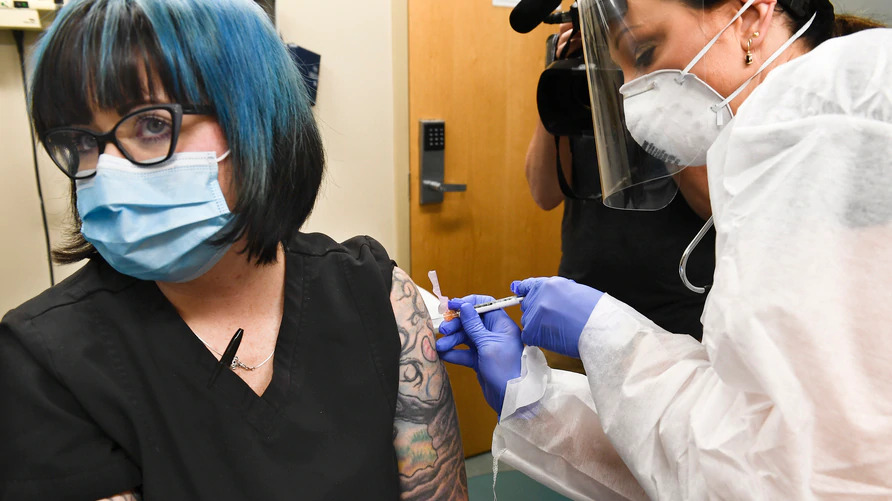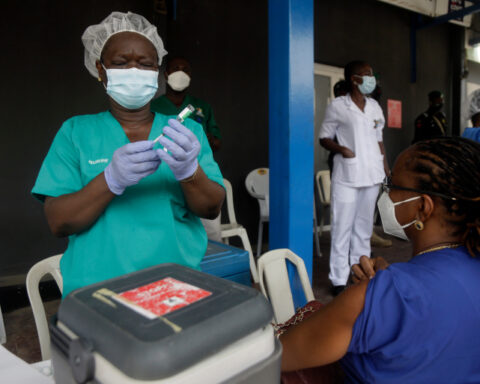If you have a severe allergic reaction to a COVID-19 vaccine
If you had a severe allergic reaction—also known as anaphylaxis—after getting the first shot of a COVID-19 vaccine, CDC recommends that you not get a second shot of that vaccine. If the reaction was after an mRNA COVID-19 vaccine (either Pfizer-BioNTech or Moderna), you should not get a second shot of either of these vaccines. Learn which COVID-19 vaccines need a second shot.
An allergic reaction is considered severe when a person needs to be treated with epinephrine or EpiPen© or if they must go to the hospital. Learn about common side effects of COVID-19 vaccines and when to call a doctor.
If you have a non-severe allergic reaction to a COVID-19 vaccine
If you had an immediate allergic reaction after getting a shot of a COVID-19 vaccine, you should not get a second shot of that vaccine, even if your allergic reaction was not severe enough to require emergency care. If the reaction was after an mRNA COVID-19 vaccine (either Pfizer-BioNTech or Moderna), you should not get a second shot of either of these vaccines. An immediate allergic reaction happens within 4 hours of getting vaccinated and may include symptoms such as hives, swelling, and wheezing (respiratory distress). Your doctor may refer you to a specialist in allergies and immunology to provide more care or advice.
If you get a rash where you got the shot
CDC has learned of reports that some people have experienced a red, itchy, swollen, or painful rash where they got the shot. These rashes can start a few days to more than a week after the first shot and are sometimes quite large. These rashes are also known as “COVID arm.” If you experience “COVID arm” after getting the first shot, you should still get the second shot at the recommended interval if the vaccine you got needs a second shot. Tell your vaccination provider that you experienced a rash or “COVID arm” after the first shot. Your vaccination provider may recommend that you get the second shot in the opposite arm.
If the rash is itchy, you can take an antihistamine. If it is painful, you can take a pain medication like acetaminophen or a non-steroidal anti-inflammatory drug (NSAID).
Safeguards Are in Place
CDC has provided recommendations for COVID-19 vaccination providers about how to prepare for the possibility of a severe allergic reaction:
- All people who get a COVID-19 vaccine should be monitored on site. People who have had severe allergic reactions or who have had any type of immediate allergic reaction to a vaccine or injectable therapy should be monitored for at least 30 minutes after getting the vaccine. All other people should be monitored for at least 15 minutes after getting the vaccine.
- Vaccination providers should have appropriate personnel, medications, and equipment—such as epinephrine, antihistamines, blood pressure monitor, and timing devices to check your pulse—at all COVID-19 vaccination provider sites.
- If you experience a severe allergic reaction after getting a COVID-19 vaccine, vaccination providers can provide care rapidly and call for emergency medical services. You should continue to be monitored in a medical facility for at least several hours.
Learn more about what to expect after getting vaccinated for COVID-19, including normal side effects and tips to reduce pain or discomfort.
CDC Is Monitoring Reports of Severe Allergic Reactions
If someone has a severe allergic reaction after getting vaccinated, their vaccination provider will send a report to the Vaccine Adverse Event Reporting System (VAERS) VAERS is a national system that collects reports from healthcare professionals, vaccine manufacturers, and the public about adverse events that happen after vaccination. Reports of adverse events that are unexpected, appear to happen more often than expected, or have unusual patterns are followed up with specific studies.






